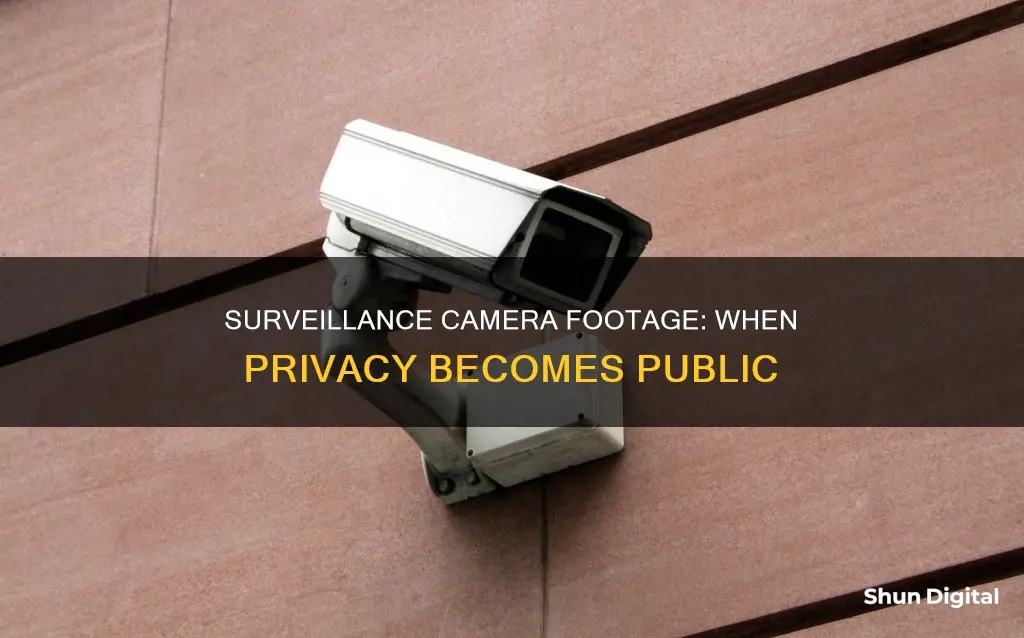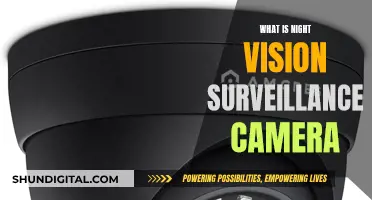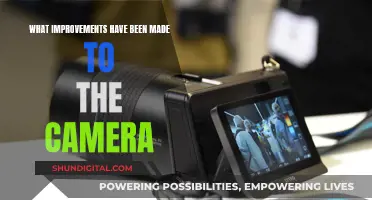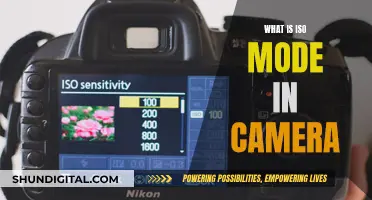
The legality of releasing camera surveillance footage depends on various factors, including consent, privacy expectations, and state-specific regulations. In the United States, it is generally legal to install security cameras and record video, but citizens are also guaranteed a reasonable expectation of privacy. This means that recording individuals in private places, such as bathrooms, changing rooms, or private bedrooms, is prohibited. Additionally, consent laws vary between one-party and two-party consent states. In one-party consent states, it is legal to record a conversation if at least one person consents, while two-party consent states require the permission of all parties involved. These laws apply to both audio and video recordings. While there may be no specific federal law governing the use of security cameras, national consent and privacy laws, as well as state and local regulations, must be considered.
| Characteristics | Values |
|---|---|
| Legality | Generally legal, but varies by state and county |
| Privacy | Cannot record in private places (e.g. bathrooms) or areas with a "reasonable expectation of privacy" |
| Consent | One-party consent is generally required for audio recordings |
| Notification | Not required, but recommended to notify employees/guests about cameras |
| Registration | Some counties require registration of security cameras and alarm systems |
What You'll Learn
- Surveillance is legal in public spaces, but not in private places
- Consent laws require permission from one or all parties for recordings
- Privacy laws vary by state, county, and city
- Businesses can legally record employees with a legitimate reason
- Notification laws require employers to inform employees of surveillance

Surveillance is legal in public spaces, but not in private places
Surveillance cameras are a common sight in many places, and they can be a valuable tool for deterring crime and protecting people's safety. However, it's important to be aware of the privacy laws that govern the use of surveillance cameras, as surveillance is legal in public spaces but not in private places.
In most countries and states, it is legal to record video in public spaces. This includes the use of everyday doorbell cameras, security cameras, and even phone cameras. It is also generally legal to record within your property, as long as it is not in areas with a greater expectation of privacy, such as bathrooms, bedrooms, changing rooms, and locker rooms.
However, when it comes to private places, the use of surveillance cameras becomes more restricted. In the United States, for example, it is illegal to record anyone without their consent in places where there is an expectation of privacy. This includes private bedrooms, bathrooms, and changing rooms. Similar laws exist in other countries, such as Canada, where the Supreme Court has reaffirmed that individuals have an expectation of privacy even in public areas where surveillance technology may be in use.
The laws around audio recording are also important to consider. In the US, the "one-party consent" law allows the recording of conversations, either in person or over the phone, if at least one person consents. However, some states have "all-party consent" laws, requiring the consent of all parties in the conversation for recording.
It's worth noting that the laws around security cameras can vary by state, county, and even city. Therefore, it's essential to check the specific regulations in your area before installing any surveillance cameras.
Overall, while surveillance cameras can be a useful tool, it's crucial to respect the privacy of individuals, especially in private places, to avoid legal consequences and protect the rights of those being monitored.
AGS Mode Camera Stopped: What's the Fix?
You may want to see also

Consent laws require permission from one or all parties for recordings
The legality of releasing camera surveillance depends on consent laws, which require permission from one or all parties for recordings. In the United States, there are two types of states: one-party consent states and two-party consent states. In one-party consent states, only one individual in a conversation needs to give permission for it to be recorded. This means that an interviewer, for example, can legally record a phone call without the other person's knowledge. However, it is important to note that this does not apply to video recordings, where capturing audio or the subject of a conversation in a public place is generally prohibited.
On the other hand, two-party consent states require all individuals involved in a conversation to be aware of and agree to the recording. There are currently 11 such states in the US: California, Delaware, Florida, Illinois, Maryland, Massachusetts, Montana, Nevada, New Hampshire, Pennsylvania, and Washington. In these states, if one party does not give consent, the other party cannot legally record the conversation.
It is worth noting that some states distinguish between electronic and in-person communication. For instance, Illinois and Oregon are one-party consent states for electronic communication but require all-party consent for live in-person communication. Additionally, consent laws may only apply when those involved in a conversation have a ""reasonable expectation of privacy." This means that recording a conversation in a public place like a coffee shop may not require consent, while recording a conversation at home would.
To further complicate matters, federal law in the US also comes into play when recording conversations across state lines. In such cases, it is generally advised to follow the strictest applicable law or obtain consent from all participants.
The consequences of violating consent laws can be serious, including criminal charges, lawsuits, fines, and jail time. Therefore, it is always best to err on the side of caution and obtain clear consent from all parties before recording any conversation or phone call.
The Camera Obscura: Unveiling Its Intriguing Components
You may want to see also

Privacy laws vary by state, county, and city
Privacy laws vary across the United States at the federal, state, county, and city levels. While there is no specific federal law that regulates the use of home security cameras, there are national consent and privacy laws that apply to video surveillance. There are also different regulations for recording audio and video footage.
In the US, it is usually legal to install a residential security camera and record video. However, citizens are guaranteed a reasonable expectation of privacy, which extends to video recording. This means that it is illegal to record people in private places, such as bathrooms, bedrooms, and changing rooms.
Consent laws govern whether or not it is legal to record someone on video or audio without their permission. On the national level, it is legal to record a conversation—either in person or over the phone—if at least one person consents. This is called the "one-party consent" law.
However, laws can vary at the state, county, and city levels. Only 15 states have specific laws around security cameras, but some counties and cities also have their own legislation. For example, in California, it is illegal to make a video recording of any communication considered confidential, regardless of consent. In Georgia, video surveillance cameras in public and private settings are permitted as long as they are in plain sight. In Florida, Alabama, and Minnesota, hidden video surveillance is allowed in non-private settings.
It is important to check local laws and regulations when installing security cameras to ensure compliance with privacy and consent laws.
The Best Autofocus Cameras: Capturing Sharp Shots Effortlessly
You may want to see also

Businesses can legally record employees with a legitimate reason
Secondly, businesses should be aware of consent laws regarding audio recordings. While video recording in public spaces is generally permitted in all 50 states, audio recording laws vary. "One-party consent" states allow individuals to record a conversation as long as they are a part of it. On the other hand, "two-party consent" states require the consent of all parties involved in the conversation for it to be recorded.
Thirdly, businesses should establish clear and unambiguous policies regarding workplace recordings. Employees should be educated about the potential risks and understand when and where recordings are prohibited. Gaining written consent from employees to search for and delete prohibited recordings on their devices is also recommended.
Finally, businesses should consider the potential impact on employee morale and stress levels. Even if audio and video recording is legal, it may harm the workplace environment and employee well-being. In such cases, signage reminding employees of company policies may be a more effective alternative to video surveillance.
In conclusion, while businesses can legally record employees with a legitimate reason, they must navigate a complex web of privacy, consent, and employment laws. Clear policies, employee education, and a consideration of the potential impact on morale are key to implementing recording practices in the workplace.
GW2 Camera Modes: Which One is Best?
You may want to see also

Notification laws require employers to inform employees of surveillance
Notification laws regarding surveillance in the workplace vary across different states in the US. While federal legislation does not require employers to inform employees of monitoring, some states have established laws that mandate employee notification.
Connecticut, Delaware, Texas, and New York
Four US states—Connecticut, Delaware, Texas, and New York—have passed laws requiring employers to notify their employees about the use of monitoring software or surveillance cameras. In Connecticut and Delaware, employers must notify their staff about the use of monitoring software beforehand. The Texas and New York Data Protection Acts also require employers to notify their employees of monitoring.
New York Surveillance Laws for Businesses
In New York, any private company that monitors employees in the workplace must provide specific notice upon hire and in a "conspicuous place" that all employees can see. An acknowledgment of monitoring must also be kept on file for each employee.
California, Florida, Louisiana, and South Carolina
The constitutions of California, Florida, Louisiana, and South Carolina explicitly state that residents have a right to privacy. While there are no laws that directly require employee notification in these states, employers may need to be cautious when setting up employee monitoring systems.
Charging Your Lumix DC Vario: A Step-by-Step Guide
You may want to see also
Frequently asked questions
In the US, it's usually legal to install a residential security camera and record video in public spaces. However, US citizens are guaranteed a reasonable expectation of privacy, which extends to video recording. This means that you can't record people in private places such as bathrooms.
No, it is not legal to release camera surveillance in private spaces. Private spaces include bathrooms, bedrooms, changing rooms, and locker rooms.
The "one-party consent" law states that it is legal to record a conversation—either in person or over the phone—if you have at least one person's consent. This means that as long as you are part of the conversation that you're recording, it's legal for you to do so.
The "two-party consent" law requires the permission of everyone in the conversation. This means that all parties involved in the conversation must give their consent to be recorded.







